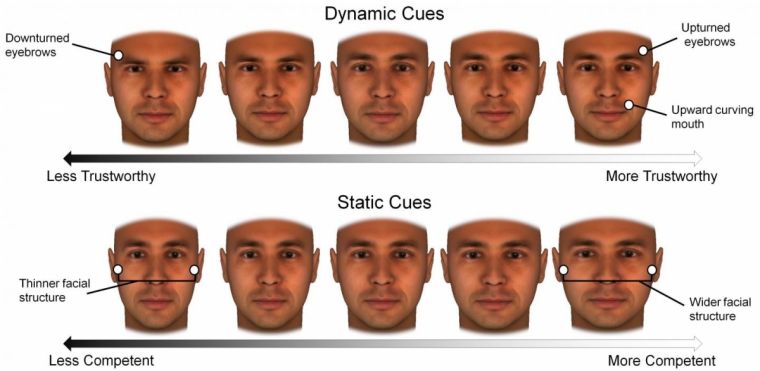Your facial features play into how trustworthy people think you are

A team of New York University psychology researchers have found that people can adjust their expressions to earn the trust of others but they cannot change how people judge their competence.
The study, which appeared in Personality and Social Psychology Bulletin, made use of four tests to determine whether the perception of a person's trustworthiness and competence can be influenced by altering one's features.
For the first test, subjects were shown five distinct photos of 10 different adult males from varied ethnicities. Based on the results, happier looking subjects were perceived to be more trustworthy than those who appeared to have a negative facial expression. Perceptions of the person's competency did not change in the different photos of the individuals.
The second test was slightly more complicated as the subjects were tasked to evaluate 40 computer generated faces that ranged from "slightly happy" to "slightly angry." As with the first test, the faces leaning towards a happier expression were deemed more trustworthy than the angrier faces. Judgement of competence was also unaffected by the different expressions of the faces.
The third test involved a real world scenario asking the subjects to choose from a selection of computer generated faces who they would choose to be their financial adviser. Once again, they leaned towards those with a happier and more positive facial expression. In terms of competence, they were more inclined towards a particular form of facial structure – those with a wider facial structure - identified in the study as being associated with physical ability and testosterone.
The final test made use of reverse correlation to determine all facial cues that contribute to people's perceptions without specifying any cues in advance.
"Our findings show that facial cues conveying trustworthiness are malleable while facial cues conveying competence and ability are significantly less so.The results suggest you can influence to an extent how trustworthy others perceive you to be in a facial photo, but perceptions of your competence or ability are considerably less able to be changed," said Jonathan Freeman, the study's senior author.
Other members of the research team include NYU post doctoral researcher Eric Hehman, and Jessica Flake, a doctoral candidate at the University of Connecticut.











